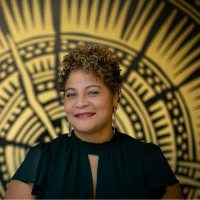No matter how long you’ve been involved in racial justice work, Jasmine Tyler from the nonprofit Free Minds says listening is key. Get her advice on being a conscious advocate at your organization and beyond.

A: Free Minds is a nonprofit based in Washington, D.C. that focuses on nurturing and amplifying the voices of incarcerated and formerly incarcerated youth through literary arts, workforce development, and violence prevention. We envision all Free Minds members accessing the necessary opportunities, inspiration, and support to write new chapters in their lives.
Every week, Free Minds plans a variety of interactive activities and events for our members in the community and incarcerated youth across the United States. Even though COVID-19 has put a temporary end to in-person events, Free Minds has risen to the challenge and found creative ways to keep our members engaged through new remote events like correspondence-based programs and virtual book clubs.
A: My most important piece of advice is: Listen to the community. It’s important to seek out thought leaders in this field who may not be as well known to the general public but who actually know the community you’re working in and how to best serve those members.
I am also constantly listening to others, whether that’s through formal listening sessions or just casual check-ins with our members and staff to see what is really going on with them and their experiences. No matter how long you’ve worked on these issues, you should be constantly striving to educate yourself by reading, listening, and building your network.
A: It is critical to include people with lived experiences to provide grounding and solutions. Everyone comes to this work with their own personal experiences and preconceived ideas, so it’s really important to seek outside guidance and advice that forces you to think outside the box. You also need to invest the time and resources into learning about other people’s experiences in this field and what you can do that is actually helpful and impactful for the community.
My most important piece of advice is: Listen to the community.
A: Without a doubt, anything written by Pulitzer Prize-winning author Isabel Wilkerson. She not only explained the legal system in her book “The Warmth of Other Suns: The Epic Story of America’s Great Migration” but also explores the psychological controls used in racist practices in “Caste: The Origins of Our Discontents.”
A: I’ve learned to WAIT, which stands for “why am I talking?” Norris Henderson, who founded VOTE in Louisiana and has been a remarkable organizer and civic leader for decades, shared this acronym with me. I have used it ever since to ensure my contributions are necessary and productive. If I can answer why my comment contributes to the conversation, then I’ll share.
A: Empathy and compassion. That includes unconditional support for and acceptance of everyone, regardless of their background or life experiences. Many of our members regard Free Minds as an extended family that always shows up and will never give up on them.
Our work is grounded in the belief that literacy, education, and the arts are key to supporting our members in exploring their potential, agency, and incredible capacity to create significant societal and community change.
Learn more about Free Minds’ mission.
Featured Photo: Help pay teachers during political unrest in Haiti by Friends of EIM, IncFind exactly what you're looking for in our Learn Library by searching for specific words or phrases related to the content you need.